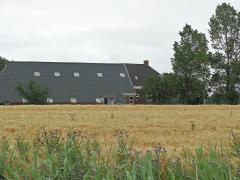Economic and environmental effects of the manure policy in the Netherlands: synthesis of integrated ex-post and ex-ante evaluation
This paper summarises the results of both an ex-post evaluation of the Dutch Mineral Accounting System (MINAS) and an ex-ante evaluation of the effect of different levy-free surplus values.
The MINAS system has been introduced in 1998 in order to reduce nitrate and phosphate leaching from agricultural soils. MINAS resulted in a reduction of the N surplus on dairy farms of approximately 50 kg ha(-1) to limited or no costs to the farms involved. MINAS resulted in higher costs for manure removal for intensive livestock farmers. Though emissions of N and P have decreased significantly during the last five years effects of this reduction in environmental quality cannot be observed, except for a small decrease in nitrate concentration of the upper groundwater. The ex-ante evaluation of different variants for possible future levy-free surplus levels indicated that under the lowest variant, the nitrate concentration in groundwater will exceed 50 mg per litre on 14% of the area. The environmental effect of the different variants for P were not distinguished. The lowering of the levy-free surplus for P will have a drastic effect on the intensive livestock farms. The incorporation of fertiliser P under the MINAS system would be a cheap option to reduce the P surplus.
Authors
Specifications
- Publication title
- Economic and environmental effects of the manure policy in the Netherlands: synthesis of integrated ex-post and ex-ante evaluation
- Publication date
- 16 April 2004
- Publication type
- Publication
- Magazine
- Water Sci Technol 2004; 49:109-16
- Product number
- 91199




